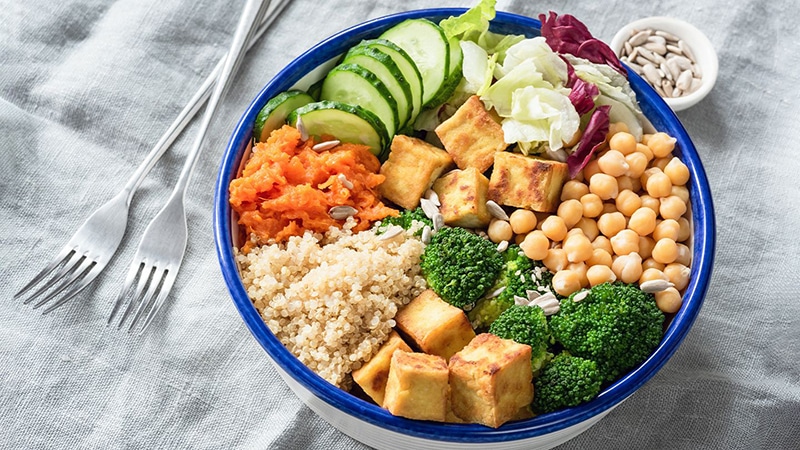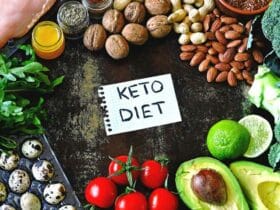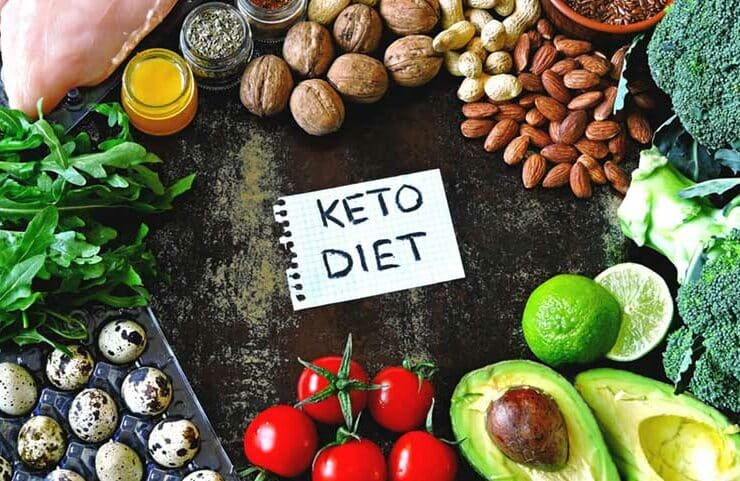Plant protein has been gaining popularity among health enthusiasts and vegans alike, and for a good reason. It offers many benefits for both your health and the planet. But with so many plant protein options available, it can be challenging to determine which one is best for you. In this comprehensive guide, we will dive deep into the world of plant-based protein and explore the various options available to help you make an informed decision.
Plant protein is an excellent choice for optimal health as it is easy to digest, promotes healthy digestion, and is loaded with essential nutrients. Studies show that a plant-based diet provides the necessary nutrients needed to support healthy lifestyle choices, including weight management, inflammation reduction, and a reduction of chronic diseases.
Key Takeaways:
- Choosing plant protein over animal protein is beneficial for optimal health.
- Plant protein sources include legumes, nuts, seeds, whole grains, and pseudo-grains.
- Plant protein powders offer a convenient and versatile option.
- When comparing plant protein products, consider sourcing, processing methods, and additional ingredients.
- Maximize the benefits of plant protein by pairing with complementary foods and portion control.
Understanding Plant-Based Protein Sources
Before we dive into specific plant protein options, it’s important to understand the sources of plant-based protein. Choosing the right plant protein will help you get the most out of your diet, and we’ve got you covered with this guide to plant-based protein sources.
Legumes
Legumes, like lentils, beans, and chickpeas, are excellent sources of plant-based protein. They’re also rich in fiber, vitamins, and minerals. Legumes are versatile and can be cooked in a variety of ways, making them a great addition to any meal.
Nuts and Seeds
Nuts and seeds, such as almonds, chia seeds, and walnuts, are also great sources of plant-based protein. They’re high in healthy fats, vitamins, and minerals, and can be added to smoothies or used as a topping for salads or yogurt bowls.
Whole Grains
Whole grains, like quinoa, brown rice, and oats, are not only great sources of plant-based protein, but they’re also rich in fiber and other nutrients. They can be used as a base for soups, casseroles, and salads.
Pseudo-Grains
Pseudo-grains, such as amaranth, buckwheat, and millet, are often confused with grains but are actually seeds. They’re also great sources of plant-based protein and are rich in fiber, vitamins, and minerals. Pseudo-grains can be used as a substitute for rice or other grains in recipes.
By incorporating these plant-based protein sources into your diet, you can reap the many benefits of plant-based protein while enjoying a variety of delicious and nutritious foods. Stay tuned for the next section, where we’ll be exploring the top plant protein powders on the market.

Exploring Top Plant Protein Powders
Plant protein powders have become increasingly popular as a convenient and versatile way to incorporate more protein into your diet. Here, we’ll explore some of the best vegan protein options available in powder form.
Pea Protein Powder
Pea protein powder is a high-quality plant protein source, boasting all nine essential amino acids. It’s also easily digestible and free of common allergens like soy, dairy, and gluten. Pea protein powder is a great option for those looking to build muscle mass or improve exercise performance.
| Nutrition Information (per 1 scoop serving) | Amount |
|---|---|
| Calories | 120 |
| Protein | 25g |
| Carbohydrates | 2g |
Brown Rice Protein Powder
Brown rice protein powder is another excellent plant-based protein option. It’s naturally gluten-free and easily digested, making it a good choice for those with digestive sensitivities. Brown rice protein powder is also rich in antioxidants and other beneficial compounds that can support optimal health.
| Nutrition Information (per 1 scoop serving) | Amount |
|---|---|
| Calories | 110 |
| Protein | 24g |
| Carbohydrates | 2g |
Hemp Protein Powder
Hemp protein powder is made from ground hemp seeds and provides a good balance of omega-3 and omega-6 fatty acids. It’s also rich in fiber, which can support healthy digestion and weight management. Hemp protein powder has a slightly nutty flavor and pairs well with a variety of recipes.
| Nutrition Information (per 1 scoop serving) | Amount |
|---|---|
| Calories | 120 |
| Protein | 15g |
| Carbohydrates | 8g |
Mixed Plant-Based Protein Powder
Mixed plant-based protein powders are a popular option, as they combine different plant protein sources to create a complete amino acid profile. Look for powders that contain a variety of protein sources, such as pea, brown rice, and hemp protein, for optimal nutrition.
| Nutrition Information (per 1 scoop serving) | Amount |
|---|---|
| Calories | 120 |
| Protein | 20g |
| Carbohydrates | 5g |
When selecting plant protein powders, look for high-quality options that are minimally processed and free of additives and artificial ingredients. With a variety of plant-based protein powders available, it’s easy to find the best vegan protein options for your needs.
Comparing Plant Protein Products
As the demand for plant protein continues to rise, the market offers an ever-growing variety of products. It can be overwhelming to choose the right high-quality plant protein product, especially when considering factors such as sourcing, processing methods, and additional ingredients. In this section, we will compare different plant protein products to help you make an informed decision.
Bars
Plant-based protein bars are a quick and easy snack option, perfect for fulfilling hunger on-the-go. However, not all bars are created equal. When comparing bars, look for those with a high protein content and limited added sugars. Also, check for additional ingredients, such as fiber, healthy fats, and vitamins and minerals to boost their nutritional value.
| Bar Type | Protein Content | Added Sugars |
|---|---|---|
| Clif Bar | 9-11g | ~20g |
| Larabar | 5g | ~18g |
| Kind Protein Bar | 12g | 4g |
Shakes
Plant-based protein shakes are a great option for a post-workout snack or a meal replacement. When comparing shakes, choose those with a high protein content, low sugar, and minimal additives and fillers. Additionally, consider the taste and texture, as well as the price and availability.
| Shake Type | Protein Content | Sugar Content |
|---|---|---|
| Orgain Organic Protein Shake | 21g | 1g |
| Garden of Life Raw Organic Meal Replacement | 20g | 1g |
| Vega Protein & Greens | 20g | 2g |
Snacks
Plant-based protein snacks offer a satisfying way to fuel between meals. However, many snacks on the market are high in sodium, preservatives, and additives. When comparing snacks, look for those made with whole food ingredients and minimal processing. Also, check the nutrition label for โปรตีนลดน้ำหนักได้จริงหรือ content and added sugars.
| Snack Type | Protein Content | Sodium Content |
|---|---|---|
| RXBAR | 12g | 105mg |
| Beanfields Bean Chips | 5g | 80mg |
| Wonderful Pistachios | 6g | 80mg |
In conclusion, when comparing plant protein products, it’s important to consider their protein content, macronutrient profile, and ingredient list. Look for those made with whole food ingredients and minimal processing to ensure high-quality plant protein.
Plant Protein vs. Animal Protein: The Benefits
When it comes to protein sources, plant-based options are gaining popularity. Many people are choosing to incorporate plant protein into their diets due to the numerous benefits it offers compared to animal protein.
One of the main advantages of plant protein is its low saturated fat content. Saturated fat can increase the risk of heart disease and other health conditions. Plant protein sources, on the other hand, contain little to no saturated fat, making them a healthier option.
Another benefit of plant protein is its high fiber content. Fiber helps promote digestive health and can reduce the risk of chronic diseases such as diabetes, heart disease, and certain cancers. Most plant protein sources are also rich in micronutrients, such as vitamins, minerals, and antioxidants.
Contrary to common misconceptions, plant protein can be just as high-quality and complete as animal protein. While animal protein sources contain all nine essential amino acids, it is possible to obtain all the essential amino acids from plant sources by combining different types of plant protein.
Choosing plant-based protein over animal protein can also help reduce the carbon footprint and save resources such as land and water. Animal agriculture is a major contributor to greenhouse gas emissions and deforestation, making plant protein a more environmentally sustainable choice.
Maximizing the Healthful Value of Plant Protein
Plant protein is an excellent source of nutrition for optimal health. However, to get the most out of it, you need to know how to maximize its benefits. Here are some tips to help you get the most out of your plant protein.
Pair Plant Protein with Complementary Foods
To optimize the amino acid profile of your plant protein, it’s important to pair it with complementary foods. This means combining plant proteins that are low in certain amino acids with foods that are high in those amino acids.
For example, if you’re eating beans, which are low in the amino acid methionine, you can pair them with rice, which is high in methionine. This will help create a complete protein meal. Other good food combinations include lentils and barley or quinoa and almonds.
Optimize Nutrient Absorption
The bioavailability of plant protein can be increased by optimizing your nutrient absorption. This means pairing it with foods that contain high levels of vitamins and minerals that help your body to absorb protein more efficiently.
Good sources of these nutrients include dark leafy greens, such as spinach and kale, which are high in vitamin C and iron. Adding a vitamin C rich food to your meal can help increase the absorption of non-heme iron found in plant foods. Vitamin B6, which is found in whole grains, nuts, and seeds, also helps your body absorb protein.
Control Your Portions
While plant protein is an excellent source of nutrition, it’s important to control your portions to avoid consuming excess calories. One recommended serving size is 0.8 grams of protein per kilogram of body weight. For example, if you weigh 68 kilograms, you should aim to consume approximately 54 grams of protein per day.
It’s also important to be mindful of how many calories you’re getting from different sources of plant protein. For example, while nuts and seeds are a healthy source of plant protein, they are also high in calories. So, if you’re trying to lose weight, it’s important to monitor your intake of high-calorie plant protein sources.
Support Your Health Goals
Plant protein can help support a variety of health goals. If you’re looking to build muscle, for example, it’s important to consume protein within 30 minutes of your workout. You can also combine plant-based protein powder with other natural ingredients to create high-protein shakes or smoothies.
Plant protein is also an excellent choice for those who are looking to reduce their intake of animal products. It can help reduce the risk of chronic diseases and lower cholesterol levels. So, whether you’re looking to build muscle, lose weight, or improve your overall health, plant protein can be an excellent choice.
Conclusion
By now, you know the best vegan protein options for high-quality plant protein and how to choose the right plant protein for optimal health. We’ve explored the benefits of plant-based protein, compared different plant protein products, and discussed the advantages of plant protein over animal protein.
Remember, when it comes to plant-based protein, options are plentiful. You can choose from a range of plant protein sources, including legumes, nuts, seeds, whole grains, and pseudo-grains. Additionally, plant protein powders offer a convenient and versatile option for those on-the-go.
When it comes to selecting high-quality plant protein products, it’s essential to consider factors like sourcing, processing methods, and additional ingredients. By making informed decisions about the plant protein products you use, you can maximize the healthful value of plant protein and support your health goals.
Choose Plant Protein for Optimal Health
Whether you’re a vegetarian, vegan or just looking to incorporate more plant-based foods into your diet, plant protein is an excellent way to support optimal health. By selecting the best vegan protein options and high-quality plant protein products, you can ensure your diet is rich in essential nutrients while reducing the risks associated with consuming animal products.
When it comes to comparison of plant protein products to animal protein, plant protein offers a range of benefits, including being easier to digest and more sustainable for the environment. So, next time you’re deciding between plant protein vs animal protein, remember that plant protein is an excellent choice for optimal health.
Thank you for taking the time to read this comprehensive guide to plant protein. We hope it has provided valuable information on the benefits of plant-based protein, how to choose the right plant protein for your needs, and ways to maximize its healthful value in your diet.
FAQ
Which plant protein is the best?
The best plant protein for you depends on your individual needs and preferences. Some popular options include pea protein, hemp protein, and brown rice protein. It’s important to consider factors such as taste, texture, nutritional profile, and any dietary restrictions you may have.
What are the benefits of plant-based protein?
Plant-based protein offers numerous benefits for optimal health. It is typically lower in saturated fat and cholesterol compared to animal protein, making it heart-healthy. Plant protein is also rich in fiber, vitamins, and minerals, and may help reduce the risk of chronic diseases such as cardiovascular disease, diabetes, and certain cancers.
How do I choose the right plant protein?
To choose the right plant protein, consider your dietary preferences, nutritional needs, and any allergies or intolerances you may have. Experiment with different plant protein sources and products to find the ones that suit your taste and lifestyle. Consulting with a registered dietitian can also provide personalized guidance.
What are some top plant protein powders?
Some popular plant protein powders include pea protein, brown rice protein, hemp protein, and soy protein. These options are often available in various flavors and can be easily incorporated into smoothies, baked goods, and other recipes. Be sure to check the nutritional information and ingredient list to find the best option for you.
How do plant protein products compare?
Plant protein products such as bars, shakes, and snacks can vary in nutritional value and quality. When comparing these products, consider factors such as the source of protein, additional ingredients, and the presence of any allergens. Look for products with minimal added sugars and artificial additives, and opt for those made from whole food ingredients.
What are the benefits of choosing plant protein over animal protein?
Choosing plant protein over animal protein offers several benefits. Plant protein tends to be lower in saturated fats and cholesterol, making it a heart-healthy option. It also provides essential nutrients, fiber, and antioxidants that can support overall health and reduce the risk of chronic diseases. Plant protein is also more sustainable and environmentally friendly compared to animal-based protein.
How can I maximize the healthful value of plant protein?
To maximize the healthful value of plant protein, pair it with complementary foods to create a well-rounded meal. This can help enhance the amino acid profile and ensure you get a variety of nutrients. Additionally, practice portion control to maintain a balanced diet and consider incorporating plant protein into meals that support your specific health goals, such as muscle building or weight management.













